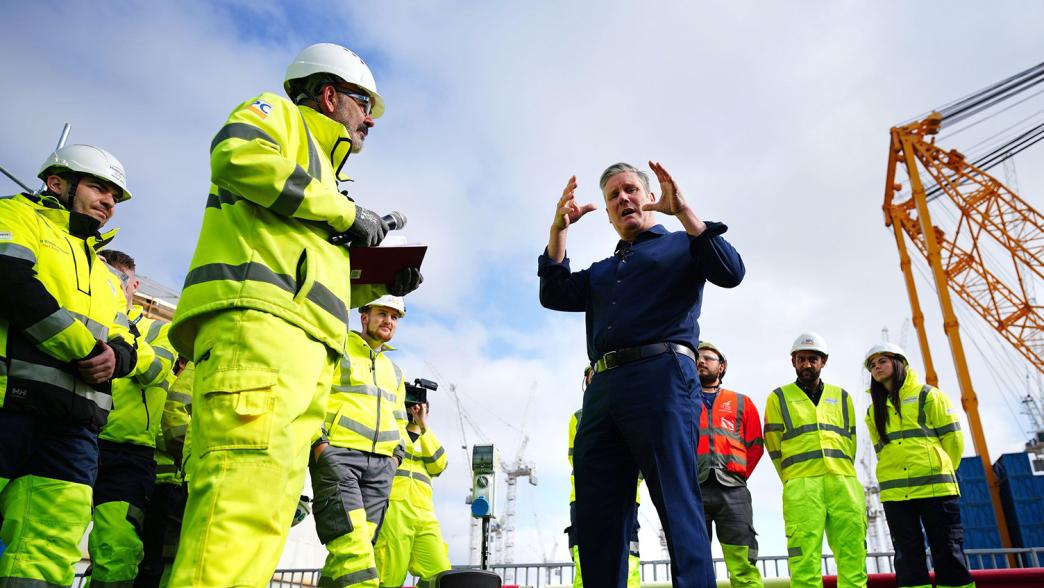Labour's £28bn green pledge was a distraction – but it needs to convince on commitment and delivery
The focus should turn to the deliverability of Labour’s energy plans.

Rachel Reeves’ eye-catching £28bn pledge came back to haunt Labour, but after ditching that pledge, the focus should turn to the deliverability of Labour’s energy plans, argues Jill Rutter
Labour’s £28bn-a-year spending commitment must have seemed like a good idea when Rachel Reeves announced it as the centrepiece of her “Green Prosperity Plan”. A lukewarm Treasury, addicted to stop-start measures on climate change, would be turned into the driving force of economic transformation. It would be an engine for spreading growth and creating good jobs, and would put the UK back in a race where its timidness about industrial strategy saw it losing ground to the cash being splashed through the US’s Inflation Reduction Act and the ambitions of the EU’s Green Deal. By naming a figure, Reeves showed that her Treasury would put its money where its mouth is.
The problem is that input targets rarely make sense. It is outcomes that matter. If Labour could deliver its climate objectives for half the cost, that would be a cause for celebration, not despair. If a well-designed regulatory and planning regime, combined with policy certainty, could deliver through private rather than public investment at acceptable cost to consumers, what’s not to like?
Since the heady days of 2021, the public finances nosedived, interest rates rose and the £28bn became a millstone even after rephrasing and redefinition. The Conservatives decided to weaponise the pledge, while soft-pedalling on their own green commitments, and moved to a strategy of using available “headroom” for short-term tax cuts not long-run investment. As the spending pledge became a distraction, the Conservatives’ pincer movement pushed Labour into a retreat.
The 2030 “mission” needs more rigorous examination
The fuss about the figure means less attention has been paid to what it is supposed to deliver. Labour wants the UK to be a Johnsonesque “clean energy superpower” by decarbonising electricity five years earlier than the current commitment – by 2030, not 2035. But from late 2024 that means going twice as fast, and with the government faltering in progress in key areas, and spooking businesses with the uncertainty created, delivering that acceleration cost effectively looks heroic.
The ambition is still there. In the latest iteration, Labour’s route to net zero is through mass-scale electrification. But it is setting itself a mammoth task. Labour claims that to deliver by 2030 it would: quadruple offshore wind with an ambition of 55 GW by 2030; pioneer floating offshore wind, by fast-tracking at least 5 GW of capacity; more than triple solar power to 50 GW; more than double our onshore wind capacity to 35 GW; get new nuclear projects at Hinkley and Sizewell over the line, extending the lifetime of existing plants, and backing new nuclear including Small Modular Reactors. All now with no guarantee of new public money.
A key delivery vehicle is Labour’s planned new creation “Great British Energy”, whose aim is to derisk investment while also, potentially, taking on a direct delivery role. It will take some time to get Great British Energy up and running and for establishing the partnerships it needs with the private sector, with energy suppliers and with local government - all of which seem critical to its success. Labour also intends to headquarter it in Scotland, so it will need to work effectively with the government there as well.
The real challenge for Labour’s green plan will be delivery
Before it can get spending, Labour needs to address some of the real constraints on what it can do. The last offshore wind auction failed. Hinkley Point looks delayed again. Even though the moratorium on onshore wind has been set aside, no new onshore wind is coming on stream.
In the Autumn Statement the chancellor announced measures to speed up grid connections, which currently are taking up to 15 years. But that is not the only constraint. Labour is pointing to the huge numbers of good jobs that will be created – but turning on that supply of trained workers is no easy task. It also takes time to grow supply chains. Labour needs to show it has plausible plans to address all these issues.
Reeves needs to reassure on Treasury commitment to net zero
The one thing the £28bn announcement did do was suggest the Treasury was – finally – getting fully behind net zero. But ditching that number raises a question mark over this commitment that could have damaging repercussions for the private investment that is vital for Labour’s ambitions.
Keir Starmer has reiterated the importance he attaches to the target, and will need to show he is willing to spend political capital early to show his commitment – not least on unlocking planning. For Rachel Reeves, having got her way on the fiscal rules, the shadow chancellor now needs to find other ways to convince that her Treasury will be a positive player, not an impediment, and to give citizens and industry the certainty they need.
- Topic
- Net zero
- Political party
- Labour
- Position
- Leader of the opposition
- Department
- HM Treasury
- Public figures
- Keir Starmer
- Publisher
- Institute for Government